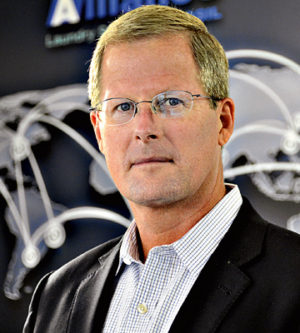“Having diversity in terms of experiences, backgrounds, skills and unique qualities are critical to a high performance culture.”
Michael Schoeb, CEO of Alliance Laundry Systems, A.L.S., knows the importance of being able to adapt. Educated in the U.S, Europe and Latin America with an MBA from Johns Hopkins University, Michael commenced his career in sales and marketing with Johnson Controls. When presented with the opportunity of an overseas assignment, he readily accepted, and the experiences grew him as a leader. Rising to General Manager before being recruited by Hilti, Michael rose to become President of the Hilti business in Brazil and then returned to a Senior VP role in the U.S. After a brief stint in the homebuilding industry, he was recruited by A.L.S. as its President/ COO and is currently Chief Executive Officer.
Michael chatted with C.O.I.’s Rowena McAllister about his international career, leadership lessons he’s passing along and what he sees as today’s greatest business challenges.
Q: Having lived and worked across the continents of North and South America – how has that experience shaped you and your family?
A: My father was a senior American diplomat and we moved frequently so there was constant exposure to different languages, ideas and situations. My early professional career was similar so all that moving around makes you incredibly adaptable and open to new ways of doing things. As CEO, I see the rate of change accelerating so you become adaptable and comfortable in that environment and it is a competitive advantage.
As for my family, they’ve picked up language skills, a great education and an ability to thrive no matter what life throws at them. For my kids, it’s been powerful and will be very complementary in their personal and professional lives.
Q: What advice would you give to someone starting out on an international career?
A: Some advice I received early in my career and that I pass along to young professionals in the early stages of their career, is don’t focus on the money, but instead think about how to gain breadth of experience. When assessing a company and opportunity, look at the overall investment in your career including the challenges and development opportunities you’ll receive, rather than the initial pay check. People who think in the shorter term will likely see their income plateau, while the longer term thinkers who see money as important but not the top driver, will reap significantly bigger benefits later.
Q: What are the most challenging aspects of adapting to a new culture or new country?
A: I would say it’s the basics; getting around, language issues and the basics of knowing how to find your way home! Once you have those down, the rest comes.
Q: Can you name a person who has had a tremendous impact on you as a leader? Why and how did this person impact your life?
A: I can think of a couple who have had a strong impact on my professional life. I started my career at York International (later acquired by Johnson Controls) and two executives there were very influential. Scott Boxer, President of one of their business units, was a fabulous mentor. Scott introduced me to Jack Scott, who ran their South American business and he gave me a series of stretch assignments and opportunities which developed me rapidly over a seven-year period. During this time, I was given several different roles in different countries, each a step up and each with its own set of unique challenges. Jack took a risk with me, allowed me to test myself and for that I will always be grateful.
Q: In your view, what are the biggest challenges facing business leaders today?
A: There are many but two come to mind. First is that most businesses are not limited by capital, products or lack of a market opportunity. It is almost always about never having enough capable leaders who can motivate people, build a team and drive consistent results. When building teams successful leaders know that mix is magic. Mix is about diversity not just of race, sex or age but of thought, experience (new and long tenured employees), personality and background.
Second is technology and how that will impact companies in the future. The speed at which it moves and the value it can create or destroy if you’re not fast enough is incredible. For our part we’re hyper focused on the customer, really understanding how our products are used and thinking through how we can adapt technology to make their lives easier and more productive.
Mike Schoeb was speaking with Rowena McAllister


